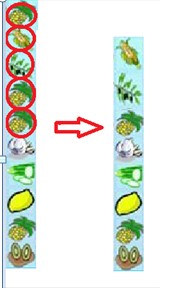
2 1 1 3 1 1 1 2 1000000 1
1 0 0
#include<iostream>
#include<algorithm>
#include<stdio.h>
#include<string.h>
#include<stdlib.h>
#include<math.h>
#include<queue>
#include<stack>
#include<vector>
#include<map>
using namespace std;
int n;
__int64 a[10010];
int v[10010];
__int64 b[10010];
int main() {
while(scanf("%d",&n)!=EOF) {
for(int i=1; i<=n; i++) {
scanf("%I64d",&a[i]);
}
memset(v,0,sizeof(v));
int t = 0;
int flag;
for(int i=1; i<=n; i++) {
int pt = t;
flag = 0;
if(v[i] == 1){
continue;
}
for(int k=1; k<=t; k++) {
if(a[i] == b[k]) {
for(int pi=k; pi<t; pi++) {
b[pi] = b[pi+1];
}
t--;
flag = 1;
}
}
if(pt == t) {
int pf = 0;
for(int j=i+1; j<=i+5 && j<=n; j++) {
if(a[i] == a[j]) {
v[i] = 1;
v[j] = 1;
pf = 1;
break;
}
}
if(pf == 0) {
b[++t] = a[i];
}
}
}
if(t == 0) {
printf("1\n");
} else {
printf("0\n");
}
}
return 0;
}版权声明:本文为博主原创文章,如有特殊需要请与博主联系 QQ : 793977586。
原文:http://blog.csdn.net/yeguxin/article/details/48000177